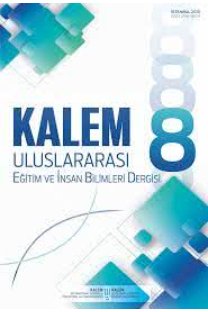Siyasal Değer Ölçeği’nin Geliştirilmesi: Geçerlik ve Güvenirlik Çalışması
Developing the Political Values Scale: A Validity and Reliability Study
___
- Barnea, M. F. and Schwartz, S. H. (1998). Values and voting. Political Pyschology, 19(1), 17-40.
- Büyüköztürk, Ş. (2012). Sosyal bilimler için veri analizi el kitabı. Ankara: Pegem Akademi.
- Byrne, B. M. (1994). Structural equation modeling with EQS and EQS/Windows: Ba- sic concepts, applications and programming. California: Sage Publications, Inc.
- Caprara, G. V., Barbaranelli, C. and Zimbardo, P. G. (1999). Personality profiles and political parties. Political Psychology, 20, 175-197.
- Caprara, G. V., Schwartz, S. H., Capanna, C., Vecchione, M. and Barbaranelli, C. (2006). Personality and politics: values, traits, and political choice. Political Psychology, 27, 1-28.
- Caprara, G. V. and Zimbardo, P. G. (2004). Personalizing Politics: A congruency mo- del of political preferences. American Psychologist, 59(7), 581-594.
- Çebi, M. S. (2002). Günümüzde siyasetin medyada inşası ve sunumu üzerine bazı dikkatler. İletişim, 14, 1-33.
- Çokluk, Ö., Şekercioğlu, G. and Büyüköztürk, Ş. (2012). Sosyal bilimler için çok de- ğişkenli istatistik SPSS ve LISREL uygulamaları. Ankara: Pegem Akademi.
- Duverger, M. (2002). Siyaset sosyolojisi. (Ş. Tekeli, Trans.). İstanbul: Varlık Yayın- ları. (Original work published in 1972)
- Ebel, R. L. (1965). Measuring educational achievement. New Jersey: Prentice Hall, Inc.
- Fichter, J. (1990). Sosyoloji nedir? (N. Çelebi, Trans.). Konya: Toplum Yayınları. (Original work published in 1957)
- Hair, J., Anderson, R., Babin, B., Black, W. and Tahtam, R. (2006). Multivariate data analysis. New Jersey: Prentice Hall.
- Haşlaman, T. (2005). Programlama dersi ile ilgili özdüzenleyici öğrenme stratejileri ile başarı arasındaki ilişkilerin incelenmesi: bir yapısal eşitlik modeli. Unpub- lished master’s thesis, Hacettepe Üniversitesi Fen Bilimleri Enstitüsü.
- Heywood, A. (2015). Siyasetin temel kavramları. (H. Özler, Trans.). Ankara: Adres Yayınları. (Original work published in 2000)
- Hofstede, G. (1980). Culture’s consequences: international differences in work-rela- ted values. USA: Sage Publication.
- Hofstede, G. (1991). Culture and organizations: software of the mind. USA: McG- raw-Hill.
- Inglehart, R. (1977). The silent revolution. Princeton: Princeton University Press.
- Inglehart, R. (1997). Modernization and postmodernization: cultural, economic and political change in 43 countries. Princeton: Princeton University Press.
- Jöreskog, K. G. and Sörbom, D. (2001). LISREL 8: user's reference guide. Chicago, IL: Scientific Software International, Inc.
- Kline, R. B. (2000). Principles and practice of structural equation modeling. NewYork: The Guilford Press.
- Lane, J. E. and Ersson, S. (2005). Culture and politics: a compoarative approach. England: Ashgate Publishing Limited.
- Özlem, D. (2002). Değerler sorununda nesnelcilik/mutlakçılık ve öznelcilik/rölati- vizm tartışması üzerine. In H. Z. Ülker, (Ed.), Bilgi ve değer (282-312). An- kara: Vadi.
- Piurko, Y., Schwartz, S. H. and Davidov, E. (2011). Basic personal values and the meaning of left-right political orientations in 20 countries. Political Psycho- logy, 32(4), 537-561
- Rokeach, M. (1967). Value survey. California: Sunnyvale.
- Rokeach, M. (1973). The nature of human values. New York: Free Press.
- Schermelleh-Engel, K. and Moosbrugger, H. (2003). Evaluating the fit of structural equation models: tests of significance and descriptive goodness-of-fit measu- res. Methods of Psychological Research Online, 8(2), 23-74.
- Schumacker, R. E. and Lomax, R. G. (2004). A beginner’s guide to structural equa- tion modeling. New Jersey: Lawrence Erlbaum Associates Publishers.
- Schwartz, S. H. (1992). Universals in the content and structure of values: theory and empirical tests in 20 countries. In M. P. Zanna, (Ed.), Advances in experimental social phychology (1-65). New York: Academic Press.
- Schwartz, S. H., Caprara G. V. and Vechione M. (2010). Basic Personal Values, Core Political Values and Voting: A Longitudinal Analysis. Political Psychology. 31(3), 421-452.
- Sharma, S. (1996). Applied multivariate techniques. New York: Josh Wiley ve Sons Inc.
- Sümer, N. (2000). Yapısal eşitlik modelleri: temel kavramlar ve örnek uygulamalar. Türk Psikoloji Yazıları, 3(6), 49-74.
- Tabachnick, B. G. and Fidell, L. S. (2007). Using multivariate statistics. USA: Pear- son Education.
- Taggart, P. (2004). Popülizm. (B. Yıldırım, Trans.). İstanbul: İstanbul Bilgi Üniversi- tesi Yayınları. (Original work published in 2000)
- Theodorson, G. A. and Theodorson, A. G. (1979). A modern dictionary of sociology. New York: Barnes & Noble.
- Waheed, M., Schuck A. R. T., de Vreese C. H. and Neijens P. (2011). More different than similar: Values in political speeches of leaders of developed and develo- ping countries. Journal of Intercultural Communication, 26, 53-76
- Waheed M., Schuck A. R. T., Neijens P. C. and de Vreese C. H. (2013). Values in the News: Comparing the News Coverage of Political Speeches in Developed and Developing Countries. Journalism Studies, 14(4), 618-634.
- ISSN: 2146-5606
- Yayın Aralığı: 2
- Başlangıç: 2011
- Yayıncı: Kalem Vakfı Okulları
Nihal YILDIZ YILMAZ, Erdal DEMİR
Siyasal Değer Ölçeği’nin Geliştirilmesi: Geçerlik ve Güvenirlik Çalışması
Türk Müziği Eserlerinin Deşifre Edilmesinde Kullanılan Stratejiler
An Analysis on Social Studies Teacher Candidates’ Hospital Service Practice Experiences
Örgütsel Sinizmin Mesleki Bağlılığın ve Örgütsel Muhalefetin Bilgi Ataletine Etkileri
Fen Eğitiminde Kaynaştırma Modülünün Öğretmenlik Uygulamasına Yansıması
HATİCE MERTOĞLU, Esra MACAROĞLU-AKGÜL
Ortaokul Öğrencilerinde Akran Zorbalığı ile Siber Zorbalık Arasındaki İlişkinin İncelenmesi
